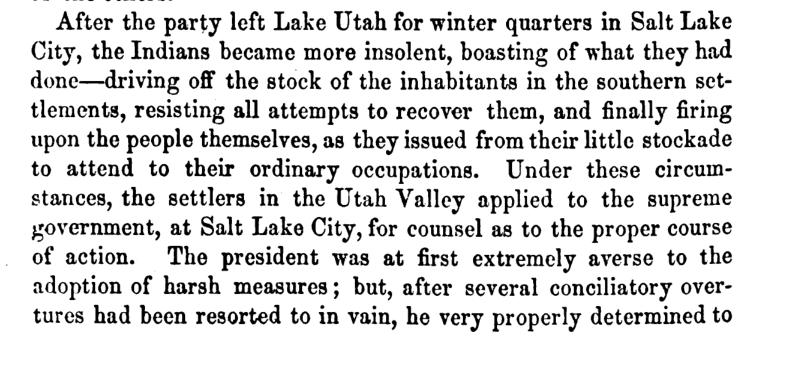Howard Stansbury provides account of expedition's aftermath planning.
- Type
- Book
- Hearsay
- DirectReprint
- Reference
Howard Stansbury, An Expedition to the Valley of the Great Salt Lake of Utah: incl. a description of its geography, natural history ... with an authentic account of the Mormon settlement (Philadelphia: Lippincot, Grambo, and Co., 1855), 148-150
- Scribe/Publisher
- Lippincot, Grambo, and Co.
- Audience
- Reading Public
- Transcription
After the party left Lake Utah for winter quarters in Salt Lake City, the Indians became more insolent, boasting of what they had done—driving off the stock of the inhabitants in the southern settlements, resisting all attempts to recover them, and finally firing upon the people themselves, as they issued from their little stockades to attend to their ordinary occupations. Under these circumstances, the settlres in the Utah Valley applied to the supreme government, at Salt Lake City, for counsel as to the proper course of action. The president was at first extremely averse to the adoption of harsh measures; but, after several conciliatory overtures had been resorted to in vain, he very properly determined to put a stop, by force, to further aggressions, which, if not resisted, could only end in the destruction of the colony. Before coming to this decision, the authorities called upon me to consult as to the policy of the measure, and to request the expansion of my opinion as to what view the Government of the United States might be expected to take of it. Knowing, as I did, most of the circumstances, and feeling convinced that some action of the kind would ultimately have to be resorted to, as the forbearance already shown had only attributed to weakness and cowardice, and had served but to encourage further and bolder outrages, I did not hesitate to say to them that, in my judgement, the contemplated expedition against these savage maruaders was a measure not only of good policy, but one of absolute necessity and self-preservation. I knew the leader of the Indians to be a crafty and blood-thirsty savage, who had been already guilty of several murders, and had openly threatened that he would kill every white man that he found alone upon the prairies. In addition to this, I was convinced that the completion of the yet unfinished survey of the Utah Valley, the coming season, must otherwise be attended with serious difficulty, if not actual hazard, and would involve the necessity of a large increased and armed escort for its protection. Such being the circumstances, the course proposed could not but meet my entire approval. The expedition was completely successful. The Indians fought very bravely, but were finally routed, some forty of them killed, and as many more taken prisoners; the latter, consisting principally of women and children, were carried to the city and distributed among the inhabitants, for the purpose of weaning them from their savage pursuits, and bringing them up in the habits of civilized and Christian life. The experiment, however, did not succeed as was anticipated, most of the prisoners escaping upon the very first opportunity.
- Citations in Mormonr Qnas
The B. H. Roberts Foundation is not owned by, operated by, or affiliated with the Church of Jesus Christ of Latter-day Saints.

